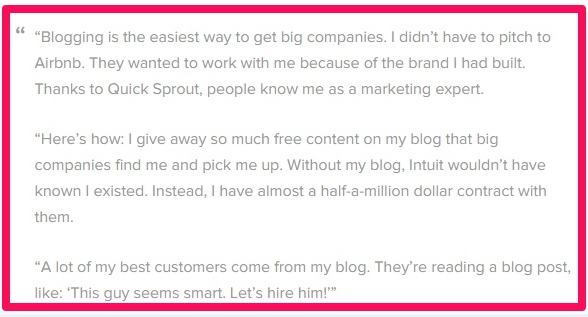The Beginner's Guide to Blogging: How to Start & Grow A Successful Blog
Blogging is one of the best ways to grow your business online. If you know how to blog, you can use this powerful marketing tool to reach your target customers and save huge marketing dollars for your business.

However, there is a learning curve.
Blogging isn’t just writing & publishing regular content. No one wants to read your content, instead, your readers are always scanning for the two things from your content.
- How can you help me save calories? A basic human survival mechanism
- How can you help me thrive? A fundamental human need.
To help you address the above two fundamental human needs through your blogging & grow your business.
On this page, you’ll find:
- What is a blog?
- What is blogging?
- Why blog to grow your business?
- How to start a blog
- How to write your first blog post
- Best ways to promote your blog
- Best blogging resources
Let’s get started…
What is a blog?
Let’s define a blog first.
A blog is a shortened version of “weblog.” It is an informational website published on the world wide web containing content that is often informal and written in a conversational style. Posts are displayed in reverse chronological order i-e the most recent post would appear on top of the page.
A blog is an excellent tool for:
- Your digital CV
- Getting feedback on your ideas
- Building a community around your passion
- Establishing rapport & authority
- Documenting your learning & life experiences
What is blogging?
An act of publishing regularly using an online medium such as a blog is usually called blogging. What you need to learn depends on whether you are looking to blog for fun or become a professional blogger.
In this detailed guide on What is blogging? All you need to know before starting, you’ll learn:
- Difference between blogging for fun and business
- Different types of blogging
- Top five benefits of blogging
- Qualities of a good blog post
- Seven step blogging plan
- How to set smart goals
Why Blog?
Is it worth the effort to start a blog in 2021 to grow your business?
A blog is a fantastic tool, which can help you simplify:
- Your online content management
- Content consumption for your internal & external clients
And the business instantly improves when you manage to do the above two things well.
How to start a blog?
Whether you’re looking to start a personal blog or a business blog, this detailed guide on how to start a blog will have everything you need to know.
In this guide, you’ll find out:
- What is a blog
- Should you start a blog
- Why start a blog
- Most popular types of blogs
- Best blogging platforms
- How to start your own blog
- Best blogging platforms
- How to start a blog with WordPress
- How to get started with blogging
- Common mistakes to avoid
How to write your first blog post
It’s not about how to write a blog post.
It’s about what to write that eats up most of your brainpower and starting from scratch is the hardest part of writing a blog post.
That’s why smart bloggers:
- Don’t create; they curate the best ideas
- Focus on their niche
- Write for themselves
- Understand different types of blog posts well
- Follow a writing framework
Also, if you have a writing framework, it gives you a big heads up and you can start writing a lot faster by completing the sections of your blog post framework to produce a unique piece of content at speed each time.
It is crucial to understand the important elements & different types of a blog post first before you can create your writing framework. In this how to write a blog post guide, I have explained all this in detail.
Best blogging resources
Blogging tools play a big part in your blog’s success.
A decade ago it was easy to choose your blog’s theme or plugin to solve a particular blogging problem because of the limited options available. However, the blogging industry has grown dramatically in the last few years so the option of blogging tools.
It is quite a daunting task now to choose the best tool to get on with blogging instead keep figuring out the best resource or a tool.
I have recorded all the tools, which helped me to concentrate on creating content on this page. I hope this blogging tools page will save you a substantial amount of time in research to focus on creating content.
Do you need ideas to simplify blogging to grow your coaching business?
If yes, please join my email newsletter, where I share my continuous learning on how to simplify blogging for business to improve your website traffic from Google.
- How to Grow Your Business Online With Blogging
- 5 Common Traits of Highly Successful Bloggers to Grow Your Business
- How to promote your blog posts (Stick to your strengths)
- How to Publish a Blog Post to Earn More Readers
- How to Write a Blog Post – A Complete Framework Documented
- Why Blog? 33 Benefits Which Will Make You Start Blogging